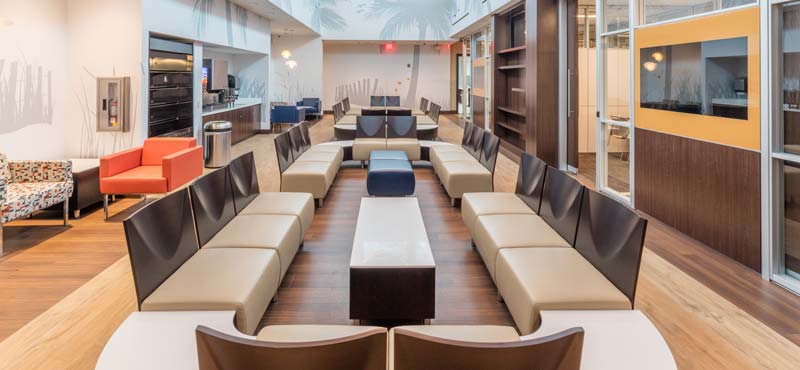
Compulsive Gambling Addictive Disorder
“Compulsive gambling” shares many of the same features of other behavioral and substance addictions and has been formally classified as an addictive disorder since 2013. That’s when it became the first addiction not involving substance use to be recognized as a treatable condition— “pathological gambling,” the American Psychiatric Association’s Diagnostic Statistical Manual 5 (DSM-5) called it.
The fact that compulsive gambling is now understood to be a behavioral disorder that can be treated with therapy, as it is at FHE Health, is good news for anyone living with a gambling problem. For a very long time it was simply assumed that compulsive behaviors like gambling were bad habits and moral failings. (Sadly, much of this stigma still exists.) Today, though, we now have a large body of evidence that shows compulsive gambling is treatable. In fact, researchers have been able to actually spot the disorder on brain imaging scans. Its symptoms seem to align with specific areas of brain dysfunction.
Hope and Healing for Gambling Addiction at FHE Health
At FHE Health, we understand the immense pain of a gambling problem. When you’re in the grip of a compulsive problem or serious addiction, it can be tempting to think you’re all alone and that there’s no way out and nobody can help. We want you to know that while we understand these feelings, you can get better. There is help, hope, and healing. We have a gambling specialist on staff who serves on the treatment team and offers focused care for gambling.
In fact, many people with similar struggles have found freedom and a new beginning here at FHE. With the guidance of our experienced gambling specialist and evidence-based therapies that address the roots of their addiction, many patients have learned how to respond to their compulsive thoughts and feelings in healthier ways. They’ve also found support through groupwork around addictions and a safe, sober, recovery-friendly living environment. Depending on the severity of the situation, our knowledgeable clinicians can also provide trusted referrals to more intensive, gambling-specific treatment and residential programs.
Gambling Therapy
FHE Health has developed therapy specifically to treat gambling addiction. Beginning at our residential treatment facility, our therapy provides individualized clinical therapies and psychiatric treatments to aid them on their road to recovery. Your medical doctor, psychiatrist, clinician, gambling specialist, and Case Manager will work side by side in conducting an initial assessment in order to customize a treatment plan that fits your needs. In addition to the more mainstream gold standards of care that we adhere to, treatment can include a variety of innovative neuroscience-based and other therapies. The goal: To create the best well-rounded treatment approach possible to optimize your recovery. Residential inpatient treatment is ideal for all addictions, compulsive gambling included, because it is the highest level of care offered and produces the best results.
Specific Treatment Methods for Gambling
The National Council on Problem Gambling estimates that around six million people in the United States suffer from a compulsive gambling problem that warrants treatment, and many of those people are suffering from a substance addiction as well. In addition, other studies have shown that there is a significant lack of gambling addiction treatment services for those who need help. At FHE Health, our aim is to bridge that gap and offer comprehensive treatment for individuals seeking help for compulsive gambling behavior alongside treatment for substance abuse.
Our evidence-based gambling interventions were developed by clinicians with years of experience in this field and has helped over 1,200 patients who have suffered from gambling and substance addiction. People who struggle with compulsive gambling require treatment plans that address every aspect of their disease, from mental health concerns to social conditions. Every patient’s path is different, so each person’s needs are also addressed differently in order to create an effective treatment plan that is tailored to that individual.
Neuro Rehab for Compulsive Gambling
For almost every illness or medical condition, physiological measures such as X-rays, blood tests, and electrocardiograms are used to make a diagnosis. At FHE Health, we believe physiological evaluations can and should be administered to treat addiction. As we continue to learn more about how the brain, addiction, and mental illnesses work, we continue to find ways to more accurately diagnose addiction and track patients’ success during treatment.
While other treatment centers diagnose based only on a description of symptoms, we utilize a 5-Tier Neuro-Rehabilitative Treatment process, which includes analysis based on brain imaging, genetic blood testing, and other advanced protocols, which helps us to provide our clients with a full picture of their condition. Utilizing state-of-the-art systems allows us to personalize your treatment plan to fit your specific needs. These diagnostic tools are also employed as a means to scientifically track your progress in treatment and tweak and personalize therapy and treatments where needed.
Family Interventions
Addiction not only affects the individual who is struggling— it affects everyone around them, hitting loved ones especially hard. Gambling can affect families in various ways. Most people struggling with a gambling problem are able to hide it for a long time, until the day when it’s impossible to hide. Often, family members—spouses, especially—are shocked and devastated when they hear how much money they’ve lost. The financial ruin caused by one person’s gambling problem has destroyed many families and relationships.
A gambling addiction can also have an emotional ripple effect. It’s not uncommon for loved ones to experience intense feelings of anger, betrayal, and grief. A gambling addiction can trigger mental health issues for family members as well; stress, anxiety, and depression can eventually take a toll on their physical health.
Start Your Healing Journey Today
At FHE Health, we strive to give every patient the opportunity for a better life, not just for themselves, but for their families as well. Our medically integrated programs, which include family therapy sessions and a weekly online support group for mental health issues, will help both you and your loved ones identify core issues and dynamics and strengthen your relationship through healthy communication.








